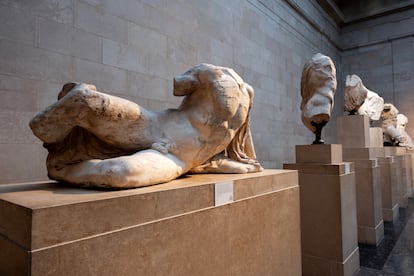The difference is in the political gestures, and although the British Prime Minister, Keir Starmer, usually appears as hieratic as a Greek statue when faced with potentially controversial issues, the calculated ambiguity with which he responds to the potential return to Greece of the so-called “marbles of the Parthenon” suggests that a historic agreement is possible under a Labor Government in the United Kingdom.
Sources from the Greek Executive have assured that “there has been progress on both sides towards the return of the Parthenon marbles.” For this reason, the Prime Minister of Greece, Kyriakos Mitsotakis, meets today with the British Prime Minister,” said a Government spokesperson in Athens. “Nothing is being hidden.” Mitsotakis has made the future return of the statues and reliefs of the friezes, metopes and pediments of the Parthenon a priority issue for his Government. The British Labor Party promised, before winning the election last July, that it would not interfere in the British Museum’s possible negotiations with Athens, although it would also not change current legislation to renounce British ownership of the marbles.
“Our position regarding marbles has not changed. “It remains a matter that primarily concerns the British Museum, and the Government is not going to modify the law to allow a definitive transfer of the Parthenon sculptures,” said a Downing Street spokesperson before the meeting between the two leaders. this Tuesday in London. The British Government has insisted that the return of the marbles was not part of the agenda of a meeting in which Starmer wanted to talk about Ukraine and a possible ceasefire in Gaza.
The coming to power of a new Labor Government has changed the pace of talks between the museum and Athens. The current president of the board, the former Minister of Economy of David Cameron’s Conservative Government, George Osborne, expedited discreet contacts with the Greek Executive for two years, in search of a solution that satisfied both parties.
Athens will never recognize British ownership of the statues – something that would be implicit in a possible loan of the works – and the United Kingdom is reluctant to recognize the alleged illegality of the acquisition of the statues in the early 19th century by Thomas Bruce Elgin, the British ambassador to the Turkish-Ottoman Empire. Lord Elgin ordered the removal of a large part of the Parthenon pieces and later maneuvered in the British Parliament to sell them to the museum.
Osborne has already negotiated with the Mitsotakis Government a possible exchange of art pieces between the British Museum and the Acropolis Museum that would camouflage the return, at least temporarily, of the sculptures to Athens. However, the conservative government of Rishi Sunak stopped the maneuver in its tracks, and even canceled a meeting in London between the prime minister tory and his Greek counterpart to avoid the issue.
Law professor at the University of Nicosia, Irini Stamatoudi, who has acted as an advisor to the Greek Government during the talks, has assured the BBC that “the possibility of an agreement is very close”, without specifying a date. Athens, the jurist said, has proposed “a strategic cultural alliance” between both countries that would propose the exchange of works of art.
However, the issue of the marbles has been obscured in recent months, after the British Museum had to face the scandal of the theft of thousands of pieces stored with little rigor in its warehouses. The matter ended with the resignation of the director of the institution, the German Hartwig Fischer. His successor, Nicholas Cullinan, has promised to open a new chapter in the cultural institution, without preconceived ideas.
The fact that the space dedicated to displaying the Parthenon collection is going to remain closed for at least two years to carry out rehabilitation works would be the perfect opportunity to send the statues to Athens, although the passionate controversy that continues to spark the matter, In both Greece and London, it calls for caution, before celebrating in advance a return that would be historic. Athens has demanded the return of the marbles since the country’s return to democracy in 1974, and there are many figures in British culture who also defend the return of the statues.

